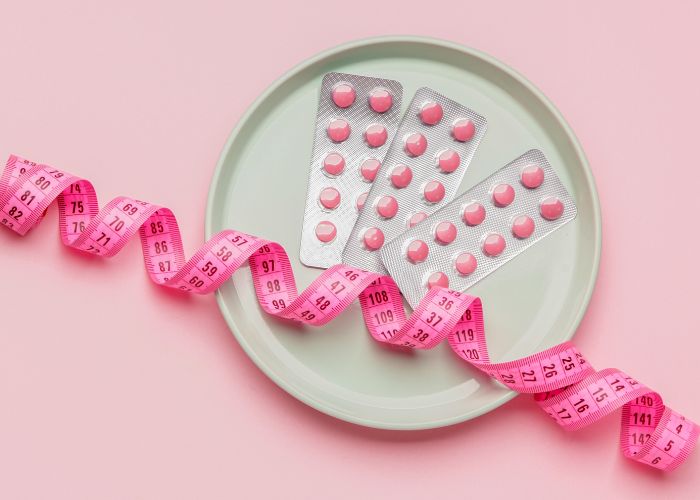The “Western Diet”, which is widespread, especially in Europe and America, i.e. a diet with a lot of meat, convenience food and few vegetables or whole grain products, has led to a dramatic increase in overweight and obesity – and is also considered a major cause of many chronic diseases. If you want to lose weight, you can use an ally within your body: our microbiome. This is because the composition of the bacterial strains in the intestine plays an important role in body weight.
Hand on heart: How often have you enjoyed a freshly prepared meal this week? Did you indulge in sweets and convenience foods whilst spending most of the day sitting? These are questions we like to address at the beginning of the new year – after all, New Year’s resolutions gnaw at our conscience and by the beginning of spring at the latest, the winter kilos should be history again. Losing weight sounds so easy: You only need to feed your body fewer calories than you need. Eat healthier, exercise more – and body fat is lost, right? And yet for most people who are overweight or even obese, it is hardly possible to lose weight permanently with the formula “eat less, move more” alone. It almost seems as if one’s own body simply does not want to lose weight. Being overweight is no longer an exception: according to the World Health Organisation, more than half of all adults and almost one-third of all children in Europe are too fat, i.e. they are overweight or suffer from obesity (body mass index over 30). In the past 30 years, the number of people affected by obesity has more than tripled – a dramatic increase that has already led medical experts to speak of an epidemic.
Obesity: a widespread disease with dangerous consequences
Who is surprised by these figures? After all, our everyday lives (or what we call Western lifestyles) are characterised by high-calorie diets and predominantly sedentary activities. Food is constantly and easily available, be it in the form of delivery services or takeaway shops or through the range of ready-made meals in the supermarket. We get the calories we need in a short time, and sweets are on the menu almost daily. The corona pandemic has exacerbated the problem: one in three adults and one in six children report unhealthy weight gain – especially people with an already high initial weight and low household income are affected.
Being overweight alone is not usually enough: metabolic syndrome, also known as the “deadly quartet”, is on the rise. If too much belly fat, high blood sugar and blood fat levels and high blood pressure occur together, the risk of developing cardiovascular diseases increases massively. It is currently estimated that 30 to 35 % of the population is affected. And this combination also affects the liver: For example, people with metabolic syndrome often develop non-alcoholic fatty liver – i.e. liver disease that does not develop because of increased alcohol consumption, but because of the Western lifestyle with an unhealthy diet and little exercise. This is because a high-calorie diet leads to increased permeability (= permeability) of the intestine, which causes increased bacterial toxins to enter the body. This so-called metabolic endotoxemia causes latent inflammation in the tissue, which in turn upsets the fat and sugar metabolism – which can even lead to further weight gain.
Microbiome determines calorie utilisation
So there are many reasons to fight excess kilos. However, permanent weight loss seems to be an unattainable goal for many of those affected. Some can eat whatever they want without ever gaining weight – but also those who try one diet after another without success. The dreaded yo-yo effect undoes all the deprivations – and soon, after a successful weight reduction, you are back to your old excess weight (or you weigh even more than before). Are we at the mercy of the yo-yo effect or is it due to supposedly weak willpower that some people cannot lose weight permanently? The fact is: the development of overweight is a complex process. Besides diet and lifestyle, many other factors play a role: lack of sleep, stress and trauma, hormones, family disposition, medication or simply – age. From around the age of 40, muscle mass decreases, metabolism and hormone balance change and weight usually increases gradually. Even with the same eating habits, this can add up to an extra kilo per year. But there is another, often overlooked factor that has a significant influence on whether we maintain or gain weight: the intestine or the microorganisms living there – our microbiome. This influences how many calories we absorb from our food and convert them into fat deposits. “The composition of the intestinal flora greatly influences our weight,” explains nutritionist and certified specialist for intestinal health Veronika Macek-Strokosch. “Different studies have shown that the colonisation of the intestinal flora is different in overweight people than in normal-weight people.”
Intestinal bacteria control eating behaviour – and vice versa.
When it comes to body weight and the metabolisation of food, two groups of bacteria are relevant: the so-called Bacteroidetes (colloquially known as “slimming bacteria”) and the Firmicutes (also known as “fattening bacteria”). Normally, Firmicutes and Bacteroidetes are present in the intestine in a balanced ratio. Overweight people, on the other hand, have a very high concentration of firmicutes in their intestines, and these are particularly good at absorbing many calories from food – as a “cushion” for bad times, so to speak. In some cases, the ratio of Firmicutes to Bacteroidetes can even be skewed up to 2,000: 1, which means that the intestine then contains 2,000 times more Firmicutes than Bacteroidetes! Slim people, on the other hand, have more bacteria from the Bacteroidetes phylum, which promote the excretion of excess carbohydrates in the stool. Thus, the intestinal bacteria of an overweight person can extract up to 20% more calories from the same amount of food than those of normal-weight people – and this has a direct effect on body weight.
However, the microbiome not only influences how many of the calories from food are converted into fat but also our eating behaviour. “Our gut inhabitants control what we want to eat,” Macek-Strokosch continues. “The Firmicutes fuel our cravings for carbohydrates and sweets, while the Bacteroidetes prefer to feed on fibre and vegetables.” And we can take advantage of that: Because if we eat a diet rich in fibre, we feed the good “slimming bacteria”. If, on the other hand, we eat a one-sided diet or frequently eat highly processed food, we support the fattening bacteria and the imbalance of too many Firmicutes and too few Bacteroidetes develops in the intestine.
Tricking Firmicutes
In the same way that the intestinal bacteria guide our eating behaviour, we can influence via our food which group of bacteria we “feed”, i.e. promote or outright starve out. “With a healthy diet, we trick the firmicutes,” says Macek-Strokosch. That means less sugar, more protein and more vegetables. Fibre serves as a food source for the “slimming bacteria” – it is found primarily in fruit and vegetables, whole grain products, legumes, nuts, seeds and mushrooms. “Many people don’t like to eat vegetables,” the nutritionist knows, “but plant fibres have a wonderful effect throughout the body.” It starts with the intense chewing in the mouth: The chewing muscles are stimulated, the fibres “clean” the teeth in the process, digestion is prepared, and once in the intestines, the plant fibres clean the intestinal walls like a broom. The good intestinal bacteria metabolise the fibres and form short-chain fatty acids from them, which lower the pH value and prevent pathogenic germs from spreading. In addition, they have a mood-lifting and anti-inflammatory effect.
Probiotics to get in shape – Via your gut!
Our intestinal bacteria react impressively quickly to a change in diet: within 24 hours, there is a change in the composition of the microbiome, i.e. a strengthening of the Bacteroidetes – which, however, only shows lasting success with a longer-term change in eating habits. To become aware of one’s eating habits – and whether they are conducive to one’s desired weight and well-being – it is advisable to keep a food diary. Multispecies probiotics with specially selected bacterial strains also facilitate the path to the desired figure: These displace the Firmicutes bacteria and balance the imbalance in the intestine. More and more studies are proving that the intestinal microbiome even affects chronic diseases such as obesity, type 2 diabetes mellitus or metabolic syndrome. For example, it has been shown that the administration of a special multispecies probiotic to patients with type 2 diabetes can reduce the permeability of the intestine and the penetration of toxins into the organism, which in turn reduces inflammatory reactions. In another study, it was shown that this probiotic can also have a positive effect on obese post-menopausal women, resulting in reduced waist circumference, fat percentage and total and LDL cholesterol.
Boost metabolism naturally
To make the dietary change even easier, you can also get help from the metabolism activator bitter melon. Bitter melon is highly regarded in Asia as it supports the gastrointestinal tract with its bitter plant substances and leads to a release of bile acids. A great side effect for all those who want to eat less sugar: The substances contained in bitter melon inhibit the craving for sweets. Despite the support from nature: There is no “fast track” to a feel-good weight – you have to walk the path yourself every day. With a balanced gut, however, you have an ally who makes this journey easier.






























